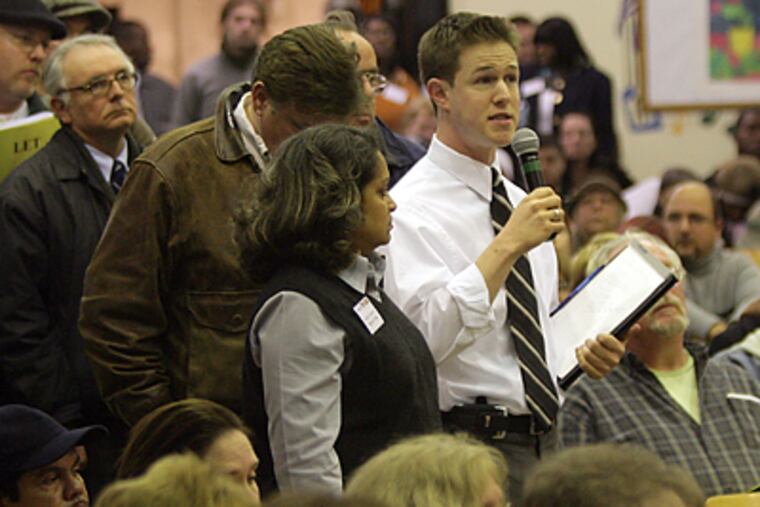Budget forums should dig deeper into issues
Let's applaud Mayor Nutter and his team for making themselves accessible in eight public meetings on the budget - that much louder because they're adding some important wrinkles to the often tired and unproductive ritual of the public meeting.

Let's applaud Mayor Nutter and his team for making themselves accessible in eight public meetings on the budget - that much louder because they're adding some important wrinkles to the often tired and unproductive ritual of the public meeting.
Most of the media reports have missed the real story of the mayor's first community meeting on the budget, held at South Philadelphia High School last month, with more scheduled through the middle of this month. Most reports have focused on the "face-off" between Nutter and citizens, as well as the angry "earful" the mayor got about proposed service cuts.
That's what we expect from the public-meeting ritual: a mayoral presentation, followed by complaints, accusations and preaching. The leader stands there and "takes it," often without a response.
Nutter and his team certainly did that, but they also modified the ritual with some curves of their own. First, the mayor didn't just "take it." He answered the questions calmly and thoughtfully.
Second, and perhaps most important, city Managing Director Camille Barnett asked citizens to complete a novel survey.
The survey gave citizens 100 points to distribute across several kinds of city expenses according to their importance: human services, parks and recreation, police, library, licenses and inspections, public health, supportive housing, fire, streets, arts and culture, and tax cuts. Citizens could give as much or as little as they pleased to each area.
From this the mayor and his team will be able to tell not only the ranking of items for each citizen, but the relative depth of passion for each item.
On the other side of the ledger, the administration asked citizens about trade-offs: What would they cut to fund a desired service?
Both kinds of questions acknowledge the reality of the current situation. In government, every program or initiative has its price. And paying for one thing always leaves less for another.
In asking citizens to rate the services and specify trade-offs, the mayor - perhaps for the first time in city history - asked citizens to make the kinds of decisions he and his team have been grappling with for the past several months. Nutter assured participants that he and his team would use the results of their input in crafting future budgets.
But the mayor and his team didn't go far enough. They asked citizens to engage in this exercise as individuals, with no one questioning why they gave more points to one item than to another - no one saying, "Wait a minute, you're willing to trade that for what?" Or, "Hey, what about my favorite thing?"
One can imagine the mayor and his team going through similar exercises, with one deputy mayor questioning another, or the managing director challenging one official or another to justify a decision to cut or not to cut.
The results of the Great Expectations project in 2007 indicated that citizens can do this kind of deliberative work when given some background information, the right structure, and skilled facilitation. Citizens relished the opportunity to talk with each other about what's important and what trade-offs they are willing to make in these hard times.
It's not too late to do this for the next round of budgeting in January or February. Why not create forums for citizens to really grapple with the difficult facts and choices that have been staring the city budget staff in the face? Challenge them to go beyond wishful don't-cut-my-stuff thinking and deal with the complexity of the current reality.
In the process, they will learn from each other. And they will be better-educated citizens with better questions for the mayor and his team.
With the mayor and his executive staff listening, they, too, will learn. Public understanding and support can emerge from those deliberations. So can new ideas.